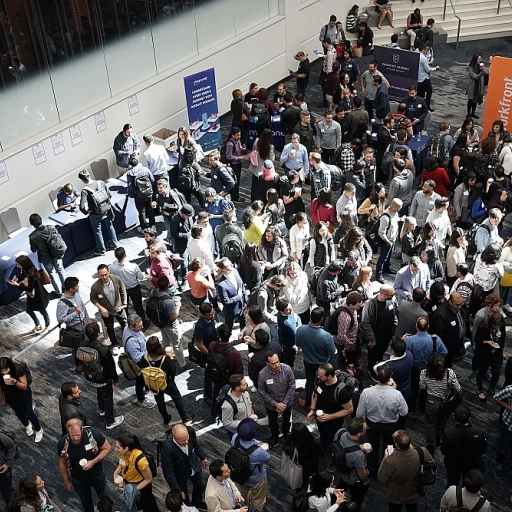
Understanding the Advertising Services Landscape
Exploring the Unique Dynamics of the Advertising Industry
The advertising services landscape is a complex and multifaceted environment. It is characterized by a fast-paced evolution driven mainly by digital advancements and shifting consumer preferences. Understanding this landscape is key for successful talent management within marketing and advertising agencies. These agencies are diverse entities that handle everything from performance marketing to creative content development. Advertising agencies vary significantly, from large marketing giants to smaller independent agencies. Each plays unique roles in delivering client-focused solutions. Digital marketing and advertising are prominent areas of focus, but traditional media continue to hold sway as well. The continuous shift towards digital channels, including social media and digital advertising, emphasizes the dynamic nature of the industry.Client Expectations and Agency Workflows
Clients in the advertising industry demand innovation, timely delivery, and measurable results, leading to an ongoing challenge for agencies to prove their value. The nature of agency work requires close collaboration across various teams and clients. Many agencies also deal with project management under tight deadlines and with fluctuating scope work. Agencies often face challenges such as keeping up with emerging trends and efficiently managing resources to meet both short-term tasks and long-term goals. As such, agency owners and managers must navigate these complexities strategically to remain competitive. These unique industry characteristics have profound implications for talent management, setting the stage for a comprehensive understanding of the topic. To delve deeper into the role of agency leaders in this intricate landscape, you can explore the role of a practice leader in talent management. This insight provides additional perspective on how practice leaders can influence both agency performance and talent adaptation strategies.Identifying Key Talent Management Challenges
Complexity of Workforce Diversity and Inclusion
In the evolving landscape of the advertising services industry, talent management is challenged by the need for diversity and inclusion. Advertising agencies must ensure their teams reflect the diverse audience they cater to, demanding a shift in traditional recruitment strategies. This isn't just a moral imperative but also a business necessity. Clients today are looking for advertising agencies that understand their diverse needs and provide inclusive solutions. Marketing and media require diverse voices to resonate with broad consumer bases, and agencies that embrace diversity can offer better creative outputs.
Sustaining Creative Excellence
Creative excellence is the heart of advertising, yet sustaining it amidst changing demands is a persistent challenge. Agencies must balance creativity with the analytical demands of performance marketing. As smaller agencies and large agencies alike push to deliver standout work in shorter timelines, ensuring a constant flow of innovative ideas can be strenuous. The constant pressure from clients necessitates a work environment where creativity can flourish without being stifled by excessive commercial pressures.
Navigating the Impact of Digital Transformation
Digital marketing has significantly reshaped the advertising industry. With the rise of digital advertising and social media platforms, the advertising scope has expanded, bringing new challenges in managing digital talent. Agencies are finding it challenging to keep up with rapid technological advancements and changing client expectations. Professionals adept at digital marketing are in high demand but short supply, creating a competitive market for skilled digital talent. Understanding these challenges faced in digital transformation can help agencies develop strategies to attract and retain the right talent.
Adapting to the Shifts in Agency-Client Relationships
As the dynamics between agencies and clients evolve, talent management must adapt accordingly. Increasingly, clients demand not just creative solutions but also measurable results, prompting a shift towards performance marketing. This change requires agencies to hire talent that not only excels in creative content but also understands data analytics. Moreover, with many clients preferring project-based work over long-term engagements, agencies face the challenge of managing a dynamic workforce that can quickly adapt to changing project scopes and timelines.
Talent management in advertising agencies requires a strategic approach to overcoming these complex challenges. By focusing on diversity, maintaining creativity, understanding digital shifts, and adapting to client relationship changes, agencies can better position themselves for success in a competitive and ever-changing industry.
Strategies for Effective Talent Acquisition
Discovering the Right Acquisition Tactics
The advertising ecosystem thrives on its most creative talents, making effective talent acquisition a paramount goal for agencies. Identifying and attracting the best candidates requires a multi-faceted approach, considering the dynamic nature of marketing and digital advertising.
Refining the Recruitment Process
Given the rapid evolution of digital marketing tools and platforms, marketing agencies must refine their recruitment process. This can involve leveraging data-driven insights to tailor their strategies to market demands and client needs. More importantly, understanding the unique challenges faced by the industry, such as adapting to performance marketing or meeting the flexible needs of smaller agencies, enables businesses to position themselves as attractive employers.
Emphasizing Employer Branding
Employer branding plays a critical role in attracting talent within the competitive advertising industry. Agencies should emphasize their culture and values, aligning them with the creative aspirations of potential hires. Independent agencies and larger establishments alike should focus on creating compelling narratives that resonate with candidates, highlighting their scope of work and opportunities for professional growth.
Utilizing Technology in Talent Sourcing
In a landscape increasingly defined by digital content and social media, agencies must effectively utilize technology in talent sourcing. Automated systems and platforms can streamline the recruitment process, identify potential challenges, and optimize marketing strategies. Incorporating AI-driven tools helps agencies sift through vast candidate pools, ensuring that potential hires meet business-specific criteria, reducing time-to-hire, and increasing efficiency.
Building Strategic Partnerships
Strategic partnerships with academic institutions and industry organizations can be pivotal in uncovering fresh talent. Collaborating with educational bodies enables agencies to tap into emerging talent pools, while partnerships with industry groups provide access to a broader network of professionals versed in the latest advertising trends and challenges. Establishing connections in these arenas strengthens an agency's talent pipeline, preparing it to meet both short-term projects and long-term business goals.
Retaining Top Talent in a Competitive Market
Ensuring Loyalty in a Competitive Environment
Retaining top talent in the advertising services industry is crucial for maintaining a competitive edge. Agencies, whether large advertising agencies or smaller independent ones, face the significant challenge of keeping their best performers while coping with the industry's fast-paced nature. The key lies in understanding the core motivations and needs of employees, which often extends beyond a paycheck.Offering Growth Pathways
Creative professionals thrive in an environment where they can see a long-term vision for their career. Agencies should prioritize developing clear career advancement opportunities and training programs that align with both the agency's business goals and the employees' personal goals. This approach not only aids in retention but also enhances the agency’s scope of work by equipping employees with new skills that address emerging media and marketing challenges.Fostering an Inclusive Culture
An inclusive and supportive work culture is vital for retention in the competitive advertising industry. Agencies must champion diversity and foster an environment where all voices are valued. By doing so, they enhance employee loyalty and satisfaction, leading to better performance and creative output, which is crucial in content and digital advertising.Utilizing Data-Driven Insights
Data plays a pivotal role in developing a deeper understanding of potential employee turnover triggers. Agencies can leverage this data to identify common challenges and address them proactively. For instance, performance marketing agencies often use data to gauge the effectiveness of their strategies, and the same principle can be applied internally to improve workplace satisfaction.Embracing Flexibility and Well-being
The modern workforce values flexibility. Forward-thinking marketing agencies are offering flexible work arrangements and prioritizing employee well-being as part of their retention strategy. By doing so, agencies can foster a more engaged workforce, reducing the risk of burnout — a common challenge within fast-paced advertising jobs.Recognition and Rewards
Recognizing and rewarding achievements can go a long way in retaining talent. While digital and social media efforts often shine a spotlight externally, it’s equally important internally. Celebrating successes within the agency not only boosts morale but reinforces a culture where excellence is acknowledged and appreciated. In the dynamic advertising agency environment, such recognition can be a substantial retention tool.Developing Talent for Future Needs
Investing in Continuous Learning and Development
Advertising agencies operate in a fast-paced environment characterized by rapid technological advancements and evolving consumer preferences. As such, continuous learning and development become imperative for sustaining both individual and organizational growth. Agencies can navigate industry changes more efficiently by prioritizing skills acquisition, especially in areas such as digital marketing, social media management, and performance marketing.
Allocating resources for training programs and workshops fosters an environment where employees feel valued and prepared to tackle the challenges faced in the advertising industry. This investment yields increased productivity and innovation, particularly pertinent for smaller agencies competing in an expansive media landscape.
Encouraging a Culture of Creativity and Innovation
The core of any successful advertising agency lies in its ability to deliver creative solutions to clients. Promoting a culture where creativity is encouraged and innovation is rewarded can significantly enhance agency scope work and output. Providing autonomy in project management, allowing teams to explore various marketing strategies, or even embracing independent agency models where creativity serves as the backbone can lead to ground-breaking marketing and advertising strategies.
Adapting to Digital Transformation
With the advertising industry's increasing shift toward digital media, agencies must ensure that their talent is adept at leveraging digital tools and platforms to align with business objectives. Offering training in analytics, data-driven marketing techniques, and digital advertising platforms will better equip teams to handle long term marketing challenges and devise more client-centric approaches.
By focusing on talent development tuned to the digital era's demands, agencies can not only meet client expectations but also stay ahead of competitors. Investing in futuristic skill development will ensure the agency is well-equipped to handle common challenges that arise with technological disruptions.
Tracking Progress and Recognizing Achievements
The importance of tracking employee progress and recognizing achievements cannot be overstated. Agencies should establish clear metrics for evaluating employee development, incorporating both short term wins and long term growth potential. Recognizing individual contributions to the company's marketing strategy or creative endeavors encourages motivation and job satisfaction.
Ultimately, developing talent for future needs ties directly to an agency’s ability to anticipate and respond to client demands effectively. Through structured development programs and by fostering a supportive community, agencies can ensure that their workforce is resilient and adaptable to the ever-evolving advertising landscape.
Leveraging Technology in Talent Management
Integrating Technology for Enhanced Talent Processes
In today's fast-paced advertising services industry, leveraging technology has become vital for effective talent management. Agencies handling diverse media platforms and advertising campaigns are increasingly relying on digital tools to manage talent acquisition and retention efficiently.- Data-Driven Decisions: Digital marketing and advertising agencies use data analytics to match the right talent with the appropriate projects. By analyzing candidate performance and agency needs, businesses can make informed hiring decisions and optimize their marketing strategy. This approach helps accommodate both short-term successes and long-term growth.
- Streamlined Recruitment Process: Automation and AI-driven tools facilitate a seamless recruitment process. For instance, advertising agencies utilize applicant tracking systems to manage resumes and filter candidates based on required skills. Such technologies enable an efficient assessment of applicant qualities and foster a smoother hiring pipeline.
- Enhanced Employee Engagement: Social media platforms and digital communication tools have been instrumental in enhancing employee engagement. By promoting an interactive work environment, agencies can foster creativity and innovation among their teams, addressing one of the common challenges in advertising.
- Remote Work Platforms: As independent and smaller agencies adapt to hybrid working models, they invest in remote work platforms that support collaboration among teams across various locations. This approach ensures the advertising agency maintains client satisfaction while handling agency challenges such as scope work changes effectively.
- Performance Monitoring Tools: Implementing technology for performance marketing allows agencies to monitor talent performance in real-time. These insights can guide agencies in identifying training needs and opportunities for professional development, crafting a comprehensive approach to nurturing creative talent.













